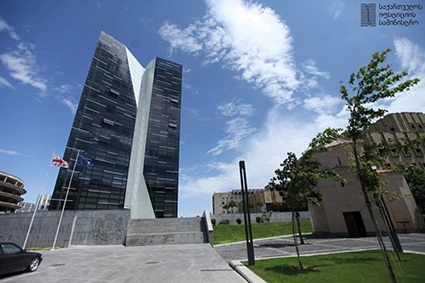Anti-Corruption Committee Working Group Meets
On Friday, July 19, the working group of the Georgian Anti-Corruption Council met at the Ministry of Justice to discuss its agenda for 2019-2020. The working group based their program on previously developed strategies and action plans and survey data from international and Georgian organizations. They also conducted a risk analysis to define the priorities of the anti-corruption policies they will develop in line with the mandate of the Council.
The Anti-Corruption Council was established on the basis of the Law of Georgia on Conflict of Interests and Corruption in Public Service. The functions of the council include: coordinating anticorruption activities in the country, updating the anticorruption action plan and strategy and supervising its implementation, monitoring the accountability of international organizations, initiating relevant legislative acts, and drafting recommendations for policymakers.
Members of the Council are defined by Presidential Decree, and include representatives of different governmental and non-governmental agencies. The Anti-Corruption Council is chaired by the Minister of Justice of Georgia, Thea Tsulukiani.
The Council’s working group is a panel of experts from relevant institutions that work on a wide array of corruption prevention measures, according to their fields of expertise. The working group develops policy documents and reports on the implementation of the Action Plan developed by the Council.
The Anti-Corruption Council developed a strategy and action plan to combat corruption in Georgia, with the cooperation of civil society and international organizations, approved by the President of Georgia. Both the strategy and action plan “identify corruption sensitive areas and provide for targeted actions aimed at the modernization of public service, development of administrative services and state procurement, reforming the public finance system, developing tax and customs systems, guaranteeing a competitive and corruption-free private sector, enhancing justice administration, increasing interagency coordination for prevention of corruption, improving the system of political party financing and preventing political corruption,” explains the Ministry of Justice. The Action Plan identifies 14 responsible agencies who submit regular reports on the implementation of the Action Plan to the Anti-Corruption Council.
Since independence, Georgia has made great strides in reducing corruption, but there is a continuous risk of a reversal of that trend, and the challenge of balancing anti-corruption and human rights measures remains.
In the 2018 Corruption Perceptions Index (CPI), released by Transparency International in January, Georgia had the best scores in the Eastern Europe and Central Asia region, coming in with 58 out of 100 points, above Montenegro (45) and Belarus (44). At the very bottom of the region, Turkmenistan earns the lowest score in the region (20), with Uzbekistan (23) and Tajikistan (25) earning only slightly more. Overall, with an average score of 35, Eastern Europe and Central Asia are the second lowest scoring regions in the index, ahead of only Sub-Saharan Africa, which has an average score of 32.
Georgia has advanced its score by two points since last year, taking 41st place among the 180 countries surveyed. The CPI 2018 does warn, however, that the country now faces “democratic backsliding, making it both vulnerable to high-level corruption” and is “a country to watch moving forward.” It attributes the downturn to “a lack of accountability of law enforcement, corruption and political interference in the judiciary, and government-sponsored attacks on independent civil society, among other issues.”
Transparency International criticized Georgia for failing to establish independent agencies to take on this mandate of battling corruption.
In an April 2019 survey, Transparency International found that while Georgians were almost never asked to pay a bribe in return for receiving public service (1% in the past 12 months), other forms of corruption are believed to be widespread. 59% of respondents say abuse of power by public officials is common in Georgia. 36% of respondents think abuse of power for personal gain by public officials is common, while only 15% think it is uncommon. 91% of those respondents who think such actions are common believe employers aim to hire their own family members, friends and relatives rather than using a fair, merit-based job application process. Regarding abuse of power, 86% of respondents think public officials abuse power in an attempt to protect their own or family businesses, 79% think there is inappropriate spending on the part of public officials, and 58% believe public officials take bribes.
By Samantha Guthrie












